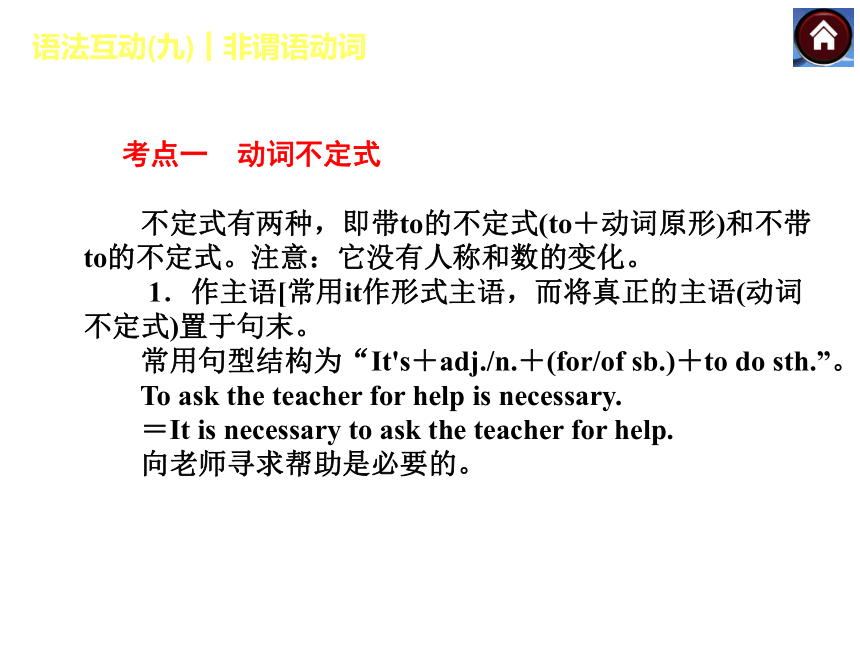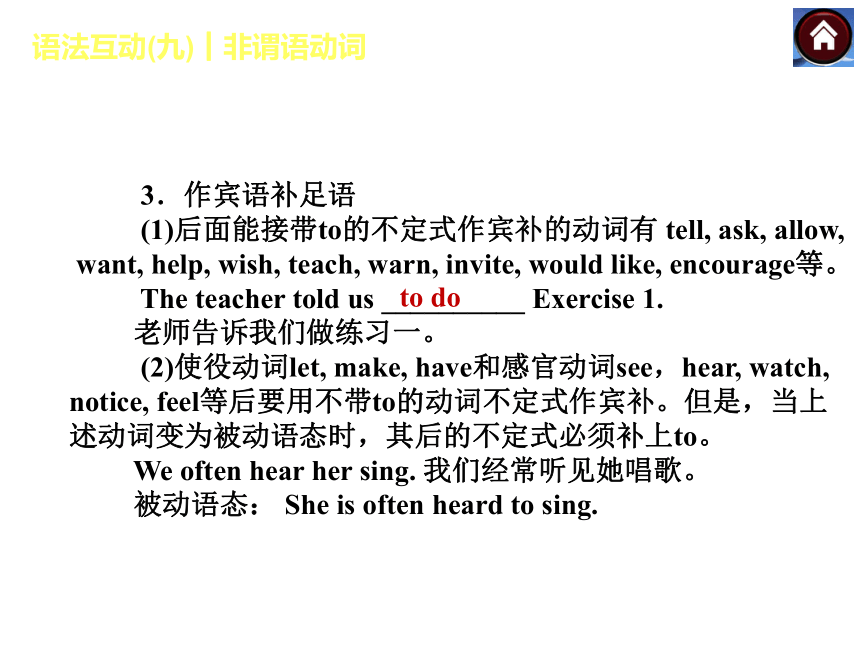【语法互动+中考复习方案】2015届九年级英语复习课件(人教):非谓语动词
文档属性
| 名称 | 【语法互动+中考复习方案】2015届九年级英语复习课件(人教):非谓语动词 |

|
|
| 格式 | zip | ||
| 文件大小 | 39.0KB | ||
| 资源类型 | 教案 | ||
| 版本资源 | 人教新目标(Go for it)版 | ||
| 科目 | 英语 | ||
| 更新时间 | 2014-12-05 00:00:00 | ||
图片预览







文档简介
课件16张PPT。语法互动(九 ) 非谓语动词 语法互动(九)┃非谓语动词 语法互动(九)┃非谓语动词 考点一 动词不定式 不定式有两种,即带to的不定式(to+动词原形)和不带
to的不定式。注意:它没有人称和数的变化。
1.作主语[常用it作形式主语,而将真正的主语(动词
不定式)置于句末。
常用句型结构为“It's+adj./n.+(for/of sb.)+to do sth.”。
To ask the teacher for help is necessary.
=It is necessary to ask the teacher for help.
向老师寻求帮助是必要的。语法互动(九)┃非谓语动词 2.作宾语
(1)后接不定式作宾语的动词有 want, try, decide, hope,
need, wish, agree, expect, refuse, learn, remember, forget,
would like/love等。
I hope __________ there before dark.
我希望天黑以前到那儿。
(2)在think, find, make等动词后通常用it作形式宾语,而
将不定式移至形容词之后,构成“主语+谓语+it(形式宾语)
+宾补(形容词/名词)+不定式”结构。
I found it difficult to solve the problem.
我发现解决这个问题很难。to get语法互动(九)┃非谓语动词 3.作宾语补足语
(1)后面能接带to的不定式作宾补的动词有 tell, ask, allow,
want, help, wish, teach, warn, invite, would like, encourage等。
The teacher told us __________ Exercise 1.
老师告诉我们做练习一。
(2)使役动词let, make, have和感官动词see,hear, watch,
notice, feel等后要用不带to的动词不定式作宾补。但是,当上
述动词变为被动语态时,其后的不定式必须补上to。
We often hear her sing. 我们经常听见她唱歌。
被动语态: She is often heard to sing.to do语法互动(九)┃非谓语动词 4.作状语
常见的状语有目的状语、原因状语、结果状语等。
Mr. Lee will go to Hangzhou to visit the West Lake. 李先
生将会去杭州参观西湖。(作目的状语) 语法互动(九)┃非谓语动词 5.作定语
动词不定式作定语时,放在被修饰的名词的后面,作后置
定语。
I don't have a partner to practice English with.
我没有一个一起练习英语的同伴。
6.作表语
Their duty is _____________________ the animals.
他们的职责是照看动物。to look after/take care of语法互动(九)┃非谓语动词 7. “疑问词+不定式”结构
动词不定式可以和what, which, when, where, how等
疑问词连用,构成不定式短语,在句中作主语、宾语、
表语、宾语补足语等。
He doesn't know ________________.
他不知道要穿什么。(作宾语)
[提醒] 动词不定式的否定结构为“not to do sth.”。what to wear语法互动(九)┃非谓语动词 考点二 动名词 动名词由“动词原形+-ing”构成,其与现在分词同形。
动名词既有动词的性质,也有名词的性质。
1.作主语
Playing computer games too much is bad for your eyes.
过度地玩电脑游戏对你的眼睛有害。
动名词作主语和动词不定式作主语,在很多情况下可以
通用。 语法互动(九)┃非谓语动词 2.作宾语
常接动名词作宾语的动词或短语有 enjoy, finish, consider
(考虑), miss, keep, mind, practice, suggest, be busy, feel like, give
up, can't help, avoid, be used to, be worth, be afraid of, be proud
of, be interested in, can't stop, keep/stop…from, look forward to,
put off, have fun等。
Have you finished __________ the book?
你读完这本书了吗?
3.作表语
The nurse's job is _________________________ the patients.
护士的工作是照顾病人。readinglooking after/taking care of语法互动(九)┃非谓语动词 4.作定语
I often go to the ______________.
我经常去阅览室。
[提醒] 有些词后既可接不定式又可接v.-ing形式作宾语,
但表达的意义不同。常见短语:
(1)stop to do sth.停下来去做另外一件事(不定式作目的状语)
stop doing sth.停止做某事(v.-ing作宾语)
(2)try to do sth. 试图(企图)做某事;尽力做某事
try doing sth.尝试着做某事
(3)forget to do sth.忘记要去做某事(还没做)
forget doing sth.忘记做过了某事(已做)
reading room语法互动(九)┃非谓语动词 (4)remember to do sth.记着要去做某事(还没做)
remember doing sth.记得做过了某事(已做)
(5)go on to do sth.做完一件事后继续做另外一件不同的事
go on doing sth.继续做原来所做的事
(6)sth. need doing(某事)需要做(被动含义)
need to do sth. 需要去做某事(主动含义)语法互动(九)┃非谓语动词 考点三 分词 分词分为现在分词和过去分词两种。现在分词(v.-ing)
有主动、进行之意;过去分词(v.-ed)有被动、完成之意。
1.作定语
China is a _________ country. America is a ________ country.
中国是一个发展中国家,美国是一个发达国家。
I know the boy called Li Ming.
我认识那个叫李明的男孩。developeddeveloping语法互动(九)┃非谓语动词 2.作表语
The book is interesting. I'm interested in it.
这本书很有趣,我对它感兴趣。
3.作宾语补足语
I saw her going upstairs.我看见她正在上楼。
I want to have some photos taken.
我想拍几张照片。
4.作状语
Laughing and talking, they went into the room.
他们有说有笑地走进了房间。语法互动(九)┃非谓语动词 5.现在分词与过去分词的区别
(1)在语态上,现在分词表示主动,过去分词表示被动。
the surprising news 令人惊讶的新闻
a surprised look 惊讶的神色
(2)在时间上,现在分词表示正在进行的动作,过去分词
表示已经完成的动作。
the developing country 发展中国家
the developed country 发达国家语法互动(九)┃非谓语动词 6.易混结构
使役动词(make, keep, let, have等)易混结构的区分。
如have sb. doing sth 与have sth. done 的区别:
(1)have sb doing sth 意为“让某人一直做某事”, do-
ing这个动作具有持续意义。如:
The teacher had the boys standing all day.
老师让男生罚站了一整天。
(2)have sth. done 意为“让某人做某事”,相当于ask sb.
to do sth, done 表示让他人完成,有被动之意。如:
I had my computer repaired yesterday.
昨天我让人修理了我的电脑。
to的不定式。注意:它没有人称和数的变化。
1.作主语[常用it作形式主语,而将真正的主语(动词
不定式)置于句末。
常用句型结构为“It's+adj./n.+(for/of sb.)+to do sth.”。
To ask the teacher for help is necessary.
=It is necessary to ask the teacher for help.
向老师寻求帮助是必要的。语法互动(九)┃非谓语动词 2.作宾语
(1)后接不定式作宾语的动词有 want, try, decide, hope,
need, wish, agree, expect, refuse, learn, remember, forget,
would like/love等。
I hope __________ there before dark.
我希望天黑以前到那儿。
(2)在think, find, make等动词后通常用it作形式宾语,而
将不定式移至形容词之后,构成“主语+谓语+it(形式宾语)
+宾补(形容词/名词)+不定式”结构。
I found it difficult to solve the problem.
我发现解决这个问题很难。to get语法互动(九)┃非谓语动词 3.作宾语补足语
(1)后面能接带to的不定式作宾补的动词有 tell, ask, allow,
want, help, wish, teach, warn, invite, would like, encourage等。
The teacher told us __________ Exercise 1.
老师告诉我们做练习一。
(2)使役动词let, make, have和感官动词see,hear, watch,
notice, feel等后要用不带to的动词不定式作宾补。但是,当上
述动词变为被动语态时,其后的不定式必须补上to。
We often hear her sing. 我们经常听见她唱歌。
被动语态: She is often heard to sing.to do语法互动(九)┃非谓语动词 4.作状语
常见的状语有目的状语、原因状语、结果状语等。
Mr. Lee will go to Hangzhou to visit the West Lake. 李先
生将会去杭州参观西湖。(作目的状语) 语法互动(九)┃非谓语动词 5.作定语
动词不定式作定语时,放在被修饰的名词的后面,作后置
定语。
I don't have a partner to practice English with.
我没有一个一起练习英语的同伴。
6.作表语
Their duty is _____________________ the animals.
他们的职责是照看动物。to look after/take care of语法互动(九)┃非谓语动词 7. “疑问词+不定式”结构
动词不定式可以和what, which, when, where, how等
疑问词连用,构成不定式短语,在句中作主语、宾语、
表语、宾语补足语等。
He doesn't know ________________.
他不知道要穿什么。(作宾语)
[提醒] 动词不定式的否定结构为“not to do sth.”。what to wear语法互动(九)┃非谓语动词 考点二 动名词 动名词由“动词原形+-ing”构成,其与现在分词同形。
动名词既有动词的性质,也有名词的性质。
1.作主语
Playing computer games too much is bad for your eyes.
过度地玩电脑游戏对你的眼睛有害。
动名词作主语和动词不定式作主语,在很多情况下可以
通用。 语法互动(九)┃非谓语动词 2.作宾语
常接动名词作宾语的动词或短语有 enjoy, finish, consider
(考虑), miss, keep, mind, practice, suggest, be busy, feel like, give
up, can't help, avoid, be used to, be worth, be afraid of, be proud
of, be interested in, can't stop, keep/stop…from, look forward to,
put off, have fun等。
Have you finished __________ the book?
你读完这本书了吗?
3.作表语
The nurse's job is _________________________ the patients.
护士的工作是照顾病人。readinglooking after/taking care of语法互动(九)┃非谓语动词 4.作定语
I often go to the ______________.
我经常去阅览室。
[提醒] 有些词后既可接不定式又可接v.-ing形式作宾语,
但表达的意义不同。常见短语:
(1)stop to do sth.停下来去做另外一件事(不定式作目的状语)
stop doing sth.停止做某事(v.-ing作宾语)
(2)try to do sth. 试图(企图)做某事;尽力做某事
try doing sth.尝试着做某事
(3)forget to do sth.忘记要去做某事(还没做)
forget doing sth.忘记做过了某事(已做)
reading room语法互动(九)┃非谓语动词 (4)remember to do sth.记着要去做某事(还没做)
remember doing sth.记得做过了某事(已做)
(5)go on to do sth.做完一件事后继续做另外一件不同的事
go on doing sth.继续做原来所做的事
(6)sth. need doing(某事)需要做(被动含义)
need to do sth. 需要去做某事(主动含义)语法互动(九)┃非谓语动词 考点三 分词 分词分为现在分词和过去分词两种。现在分词(v.-ing)
有主动、进行之意;过去分词(v.-ed)有被动、完成之意。
1.作定语
China is a _________ country. America is a ________ country.
中国是一个发展中国家,美国是一个发达国家。
I know the boy called Li Ming.
我认识那个叫李明的男孩。developeddeveloping语法互动(九)┃非谓语动词 2.作表语
The book is interesting. I'm interested in it.
这本书很有趣,我对它感兴趣。
3.作宾语补足语
I saw her going upstairs.我看见她正在上楼。
I want to have some photos taken.
我想拍几张照片。
4.作状语
Laughing and talking, they went into the room.
他们有说有笑地走进了房间。语法互动(九)┃非谓语动词 5.现在分词与过去分词的区别
(1)在语态上,现在分词表示主动,过去分词表示被动。
the surprising news 令人惊讶的新闻
a surprised look 惊讶的神色
(2)在时间上,现在分词表示正在进行的动作,过去分词
表示已经完成的动作。
the developing country 发展中国家
the developed country 发达国家语法互动(九)┃非谓语动词 6.易混结构
使役动词(make, keep, let, have等)易混结构的区分。
如have sb. doing sth 与have sth. done 的区别:
(1)have sb doing sth 意为“让某人一直做某事”, do-
ing这个动作具有持续意义。如:
The teacher had the boys standing all day.
老师让男生罚站了一整天。
(2)have sth. done 意为“让某人做某事”,相当于ask sb.
to do sth, done 表示让他人完成,有被动之意。如:
I had my computer repaired yesterday.
昨天我让人修理了我的电脑。
同课章节目录
- 词法
- 名词
- 动词和动词短语
- 动词语态
- 动词时态
- 助动词和情态动词
- 非谓语动词
- 冠词
- 代词
- 数词和量词
- 形容词副词及其比较等级
- 介词和介词短语
- 连词和感叹词
- 构词法
- 相似、相近词比较
- 句法
- 陈述句
- 一般疑问句和否定疑问句
- 特殊疑问句及选择疑问句
- 反意疑问句
- 存在句(There be句型)
- 宾语从句
- 定语从句
- 状语从句
- 主谓一致问题
- 简单句
- 并列句
- 复合句
- 主谓一致
- 主、表语从句
- 名词性从句
- 直接引语和间接引语
- 虚拟语气
- 感叹句
- 强调句
- 倒装句
- 祈使句
- 句子的成分
- 句子的分类
- 题型专区
- 单项选择部分
- 易错题
- 完形填空
- 阅读理解
- 词汇练习
- 听说训练
- 句型转换
- 补全对话
- 短文改错
- 翻译
- 书面表达
- 任务型阅读
- 语法填空
- 其他资料
